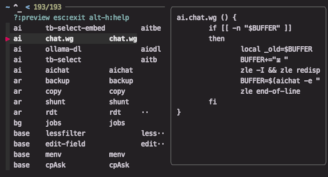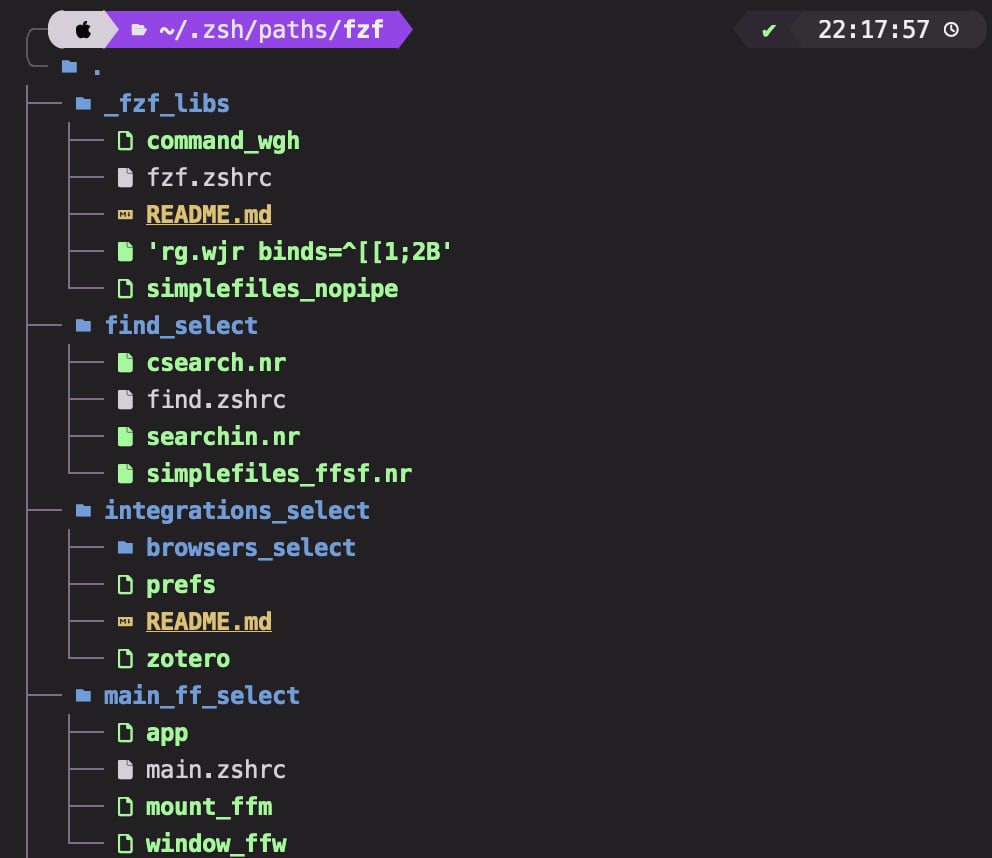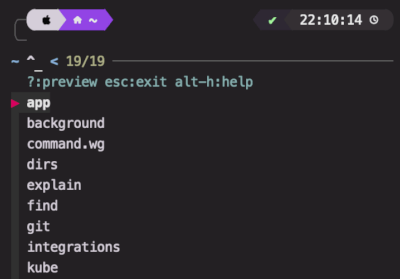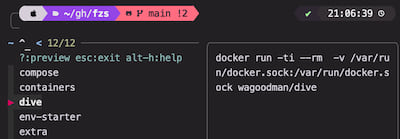4 releases (2 breaking)
| 0.4.0 | Jan 6, 2025 |
|---|---|
| 0.3.1 | Jan 4, 2025 |
| 0.3.0 | Jan 4, 2025 |
| 0.2.0 | Sep 22, 2024 |
| 0.1.0 |
|
#318 in Development tools
550KB
2K
SLoC
FZS
FZS is a fuzzy selector for your binaries.
It generalizes the function of launchers like rofi and alfred/raycast. Using the concept of a plugin to group related actions, it allows you to access any of your binaries/scripts/shell functions/aliases within 2-3 keystrokes in the vast majority of cases.
[!NOTE]
It does this by auto-accepting based on the starting substring.
If there is no starting substring match, the selector falls back to fuzzy selection.
- Enter/Space can be used to manually accept.


FZS was defined to be simple, hackable, modular and portable. It uses a few rules to parse your plugin folders and convert the contents into functions. Using the parsed structure, it creates:
- a folder of executables which get added to your PATH
- ...allowing you to autocomplete your (now namespaced) actions
- a short initialization script providing some base functionality.
- and fully customizable individual selectors for each plugin.
- ...built from by supplying the parsed content to a template, which is itself customizable, as are most other things.
[!NOTE]
Once the creation is done, fzs gets out of your way.
- It leaves your files untouched, and doesn't necessitate any specific changes or extra work in your setup to accomodate it, beyond sorting your commands and scripts into plugin folders.
- However, it does make use of an optional special naming format which allows you to specify finer details about your commands.
- The finished initialization scripts are pure compiled zsh, and and take less than <1ms on an M1.
Other features include:
- Turning functions into zle widgets, (allowing you to modify your command line on the fly or access them through keybinds)
- Auto-compile your source code (In progress)
- Declutter your PATH while keeping everything organized
- This is can really impove your computer's performance
- Complete and helpful error checking, together with an optimized mode that can be run on shell startup to auto-update (In progress)
- ...More features
Concepts
FZS is mainly an organizational framework. Related actions are grouped into Plugins, which live as folders within a FZS_ROOT_DIR (default: ~/.fzs) on your machine.

A folder is treated as a Plugin if its name matches a plugin_regex. The root directory scans for plugins non-recursively, and for each, the following happens:
[!NOTE]
By default, this is
^([a-zA-Z0-9]+)(?:_([a-zA-Z0-9-]+))?(?:_([a-zA-Z0-9-]+))?_select$(See). That means it any folder that looks likename_alias?_description?_selectwill become a Plugin with the fields ofname, alias, description.
- The name of the plugin should be a unique (descriptive) identifier
- The alias of a plugin is the actual namespace the plugin's actions get put under.
- For example, an executable
dlvliving inside a foldervideo_v_video-plugins_select, is accessible usingv.dlv, orv.<TAB>if you have autocomplete.- Defaults to name if not provided.
- Aliases need not be unique, so that you may combine multiple related plugins.
- The description is shown sometimes when using certain selectors/autocomplete functions.
The plugin is populated with executables from its folder matching the fn_regex.
The functions get symlinked to fn_template (Default: {{ pg_alias }}.{{ name }}).
[!NOTE]
By default, this is,
^(_*[a-zA-Z0-9-]+)(?:_([a-zA-Z0-9-]*))?(?:_([a-zA-Z0-9-\(\)_ ]+))?(?:\.[a-zA-Z0-9,\. ]+)?meaning that any executable that looks likename_alias_description.modifiers(.ext)?gets parsed into the expected function, which is included in a plugin selector, and shown below.
- Modifiers make it easy for you configure extra behavior your functions without resorting to a config file, at the expense of weird file names.


Plugins can also be configured in sources: non-executable files with a specific extension within the associated directory (Default: .zshrc), allowing you to effortlessly include your aliases and shell functions (more on that below).
[!NOTE]
There is also neutered version of a plugin, called a linkedbin. It parses a pattern of
_name_description?, and namespaces your functions in that folder, but the executables under it do not get added to the selector. Note that if you use anamewhich collides with an existing plugin, the linkedbin is merged with that plugin, and its functions are accessible under thealiasof that plugin. Essentially, it just auto-adds theNAflag to every parsed executable.This is helpful for helper scripts, you may choose to use a folder name like
_docker_libsor_provision_terraform-libs.
Next, the sources are scanned for lines beginning with # :. Include this above your function, named like $name_alias?_description? (The same fn_regex, but prefixed with a $), and your function will be included in the plugin, just like an actual binary.
[!NOTE]
ZSH variable declaration rules means you are a limited to valid characters which don't include
-, but you can get around it by overriding the name on the hash line, using the CMD flag, or using a different namingScheme.
Finally, fzs handles the rest, and creates:
- A plugin selector
- A selector for all parsed functions (even linkedbins)
- Selectors for all your plugins
- Various widgets, keybinds, aliases associated to your actions
The rest is up to the plugins you choose.
Modifiers
The hash line allows further options, in general, you may use the form # : FLAG1,...FLAGN name=nothing-nice alias=tosay cmd=echo binds=^E desc=nothing at all
These field=value tokens are called modifiers, and are space seperated, except for desc, which must be the last if present.
The are allowed on executable filenames too, after the first period. i.e. rg.wjr binds=^[[1;2B will allow you to call your rg script using shift-down. (This format for parsing is non-configurable, but these options can also be set through a config file).
Guide
Installation
cargo install fzs
Binaries are also available from the release page.
- Optionally, install:
- bat/eza to improve fzf preview experience.
- Add the following to your config:
fzf_dir_cmd = "eza -T -L 2 --icons --color=always ${@}"fzf_pager_cmd = "bat -p --color=always --terminal-width \\$FZF_PREVIEW_COLUMNS"
- Add the following to your config:
- pueue to allow running commands in background.
- Use the
PBGflag to enable this on a compatible action.
- Use the
- bat/eza to improve fzf preview experience.
Configuration
Put your binaries and shell functions in FZS_ROOT_DIR (default: ~/.fzs)
The config file lives in ~/.config/fzs or can be supplied with fzs --config <filepath> (todo). Check Structs for all available options.
- Note that any useful plugin setting can also be configured using modifiers and decorators, so that only the
[settings]block is needed. - The config file can however, override any values set in the scanning stage.
- For example:
[[plugins]]
name = "pijul"
alias = "pj"
fns = [
{ name="diff", alias="pjd", cmd="pj diff | bat -l diff" }, # available as pj.diff or pjd
{ name="log-hashes", alias="pjlh", cmd='pijul log --hash-only' },
{ name="changes", FLAGS="WJSUB" }, # Adds the output of the pj.changes to your command line buffer
{ name = "pull", binds = [ "^x^p" ] }, # (turns the binary pj.pull, which must be defined elsewhere, into a widget, and) adds the ^x^p keybind to call it. Use cat -v to find your keybind keycode.
{ name = "push", flags = [ "PBG" ] } # Runs pj.push in the background when selected, requires pueue
]
[[plugins]]
name = "eza"
fns = [
{ name="list-all", cmd="eza -la", bind='^[OQ' },
{ name = "find", flags = [ "PG" ] }, # adds the find plugin to the eza_selector
]
# MAIN
# Having each option start with a different letter makes selection quicker.
[[plugins]]
name = "main"
alias = "m"
fns = [
{ name = "command.wg", alias="ffex", flags = [ "WG" ], binds = ["^[^X"] }, # defined as a widget in, say, $HOME/.zsh/paths/main_select/main.zshrc
{ name = "background", flags = [ "PG" ] }, # references a folder named background_select somewhere inside `root_dir`
{ name = "explain", flags = [ "PG" ] },
{ name = "find", flags = [ "PG" ] },
{ name = "git", flags = [ "PG" ] },
{ name = "integrations", flags = [ "PG" ] },
{ name = "kube", flags = [ "PG" ] },
{ name = "l", flags = [ "PG" ] },
{ name = "ranger", flags = [ "PG" ] },
{ name = "monitor", flags = [ "PG" ] },
{ name = "network", flags = [ "PG" ] },
{ name = "peek", flags = [ "PG" ] },
{ name = "system", flags = [ "PG" ] },
{ name = "vid", flags = [ "PG" ] },
]
binds = [ "^[w" ]
[settings]
root_dir = "$HOME/.zsh/paths"
plugin_selector_binds = [ "^[p" ]
fzf_dir_cmd = "eza -T -L 2"
fzf_pager_cmd = "bat -p --color=always --terminal-width \\$FZF_PREVIEW_COLUMNS"
Finally, downloading plugins
A window, app, file, directory, quick peek launcher can be found here.
- Clone it into
FZS_ROOT_DIR - (Migrate/download other plugins)
- Run fzs
- Paste the output into your
.zshrc - Run
exec zsh - Activate the default selectors with
^]f,^]p! (Make sure they aren't overridden).
Usage tips
Bind a key to switch to terminal and activate your "main" selector. On mac, this requires Karabiner or shkd (and yabai if you need instant desktop switching). Here is my karabiner json:
{
"conditions": [
{
"bundle_identifiers": [
"^com\\.apple\\.Terminal$",
"^com\\.googlecode\\.iterm2$",
"^co\\.zeit\\.hyperterm$",
"^co\\.zeit\\.hyper$",
"^io\\.alacritty$",
"^org\\.alacritty$",
"^net\\.kovidgoyal\\.kitty$",
],
"type": "frontmost_application_unless"
}
],
"from": {
"key_code": "w",
"modifiers": { "mandatory": ["control", "left_option"] }
},
"parameters": { "basic.to_delayed_action_delay_milliseconds": 200 },
"to": [
{ "shell_command": "/opt/homebrew/bin/yabai -m space --focus 7" }
],
"to_delayed_action": {
"to_if_canceled": [
{
"key_code": "w",
"modifiers": ["right_option"]
}
],
"to_if_invoked": [
{
"key_code": "w",
"modifiers": ["right_option"]
}
]
},
"type": "basic"
},
On Linux, it's a lot easier and smoother:
(todo)
[!NOTE]
You may also need to include
yabai -m signal --add event=space_changed action='yabai -m window --focus $(yabai -m query --windows --space | jq -r '\''[.[]|select(."is-visible")][0].id'\'')'if you are selecting by space.
- Having each option start with a different letter makes selection quicker.
- To set define a "default action" for your plugin, you may want to use a name for the action sharing the same first letter with the plugin, so that you can double-tap to activate.
fzs also treats a plugin whose name is base as a special case:
- The executables inside are not namespaced (The
fn_templateis not applied to them) - All executables within are detected, not just
So i.e., you could just drop/symlink all your existing extra $PATH directories in here, and use fzs as just a selector for them, if you wish.
You may want to implement some shared keybinds on fzf:
export FZF_DEFAULT_OPTS="
--info=inline
--preview-window=:hidden:cycle
--cycle
--ansi
--preview 'lessfilter {}'
--prompt='∼ ' --pointer='▶' --marker='✓'
--bind '?:toggle-preview'
--bind 'ctrl-a:select-all'
--bind 'ctrl-y:execute-silent(echo {+} | pbcopy)' # your clipboard command of choice
--bind 'ctrl-o:execute(o {1})' # open -a if you're on mac, xdg-open if on linux
--bind 'alt-o:execute($EDITOR {1})'"
Alternatives
- Rofi
- Alfred
- Raycast
- fzf-tab
Comparison
TODO
Structs
Plugin
struct Plugin {
name: String,
alias: Option<String>,
desc: Option<String>,
fns: HashMap<String, Action>,
sources: Vec<PathBuf>,
binds: Vec<Keybind>,
// not recommended to set
path: PathBuf
fn_template: Option<String>,
fn_table_template: Option<String>,
}
Fun
struct Fun {
name: String,
alias: Option<String>,
desc: Option<String>,
cmd: Option<String>,
flags: FnFlags,
binds: Vec<Keybind>,
}
GlobalConfig
struct GlobalConfig {
root_dir: PathBuf, // the directory to scan
path_dir: PathBuf, // where your binaries are symlinked to
config_dir: PathBuf, // not available in .config
data_dir: PathBuf, // where the resultant initialization scripts live
plugin_regex: Regex, // The regex used to detect plugins. Supports name alias? desc? as the capturing groups in order
linkedbin_regex: Regex, // The regex used to detect linkedbins. Supports alias? desc? as the capturing groups in order
fn_regex: Regex, // The regex used to detect actions. Supports name alias? desc? as the capturing groups in order
name_from_cmd_regex: Regex, // When decorated with # CMD, the following command declaration is parsed into an action using this name. See # Templates.
name_from_alias_template: String, // When decorated with # AL, the following alias declaration is parsed into an action using this name. See # Templates.
selector_widget_template: String, // The name for a selector widget
fn_template: String, // What a binary gets symlinked to
fn_table_template: String, // The format used to pass a function into the fzf selector, see # Templates
all_fn_table_template: String, // The format used to pass a function into the fzf selector for all functions, see # Templates
template_file: PathBuf, // The template file used to build a selector widget. Allows for full customization of the selector behavior. One is created by default in config_dir if not specified.
init_file: PathBuf, // The path to use for the generated file which initializes fzs and sources your source scripts, relative to `data_dir`.
fzs_name: String, // The namespace for fzs related helper shell functions
generated_file: PathBuf, // The path to use for the generated file which initializes plugins, relative to `data_dir`.
plugin_selector_binds: Keybinds, // The keybinds to activate the selector for all plugins (default: ^[p)
all_fn_selector_binds: Keybinds, // The keybinds to activate the selector for all functions (default: ^[f)
fzs_fzf_dir_cmd: String, // Templated into the init_file to configure which command is used to preview a directory (default: ls -la)
fzs_fzf_pager_cmd: String, // Templated into the init_file to configure which command is used as a pager (default: less -RX)
fzs_fzf_cmd_preview: String, // Templated into the init_file to configure which command is used as a pager (default: source $fzs_init_file > /dev/null 2>&1; source $fzs_plugins_file > /dev/null 2>&1; which -a {3})
// This sources your functions so that all definitions are available. The effect should not be noticable
}
Flags
enum FnFlag {
WG, // Widget: Just makes the selector invoke this function with zle. This should target an existing widget.
TV, // Invert Visibility. When zle is active, widgets are hidden. This flag enables the widget even when zle is not active. On a non-widget, this hides the action when zle is inactive. See the section on fzl.
WJR, // Creates a widget from the target. Adds the current command-line to the stack and replaces it with the target's command, but does not execute (allowing the user to supply arguments).
WJSUB, // Same as above, but the output is added to the command line buffer.
WR, // Creates a widget from the target.
WSUB, // Creates a widget from the target. The output is added to the command line buffer.
PGI, // flatmap's the target plugin's actions into the containing plugin.
PBG, // Replaces the function such that calling it will run it in the background. (Requires pueue).
PG, // Plugin
SS, // Subshell: When selected, runs the command in a subshell
NA, // NoAdd: The default flag for an executable in a linkedbin folder.
NR, // NR: When selected, fzs will not run the command, only add it to your command line buffer.
NN, // The function is not namespaced, you can call it directly by it's name
CMD, // Only inside sources: Treats the following function declaration literally, rather than attempting to parse it with fn_template. (A name is chosen from it using name_from_cmd_regex).
AL, // Only inside sources: Use it above a line of the form: alias name='echo hi'. It will add it to your plugin with a name built from name_from_alias_template.
}
Templates
fzs builds the resulting functions from the parsed structure using templates. Here are the defaults:
-
fn_template:
{{ pg_alias }}.{{ name }} -
selector_widget_template:
{{ alias }}._select.wg
The last two have to do with the how the lines describing each action which are fed into the $fzs_name._base-select.wg/$fzs_name.all-fn-select.wg are built (See fzs_init.zsh in the source code):
- name_from_alias_template:
{{ alias }}.al {{ name }} {{ flags }} {{ cmds }} {{ desc }}- all_fn_table_template:
{{ pg_alias }} {{ cmds }} {{ name }} {{ alias }} {{ desc }}
source files
fzs also provides the variables this=plugin_alias, this_name=plugin_name for your sources, which may aid you in defining your functions. For example, the following snippet runs the current command line using pueue:
# : CMD,WG
$this.add.wg() {
pueue add -- $BUFFER
zle reset-prompt
zle kill-buffer
}
zle -N $this.add.wg
bindkey '^[z' $this.add.wg
- The use of
CMDis because$add.wgis not a valid variable name and fzf won't be able to supply the actual name correctly.
[!NOTE] FZS does not template your sources! Advantages:
- Your scripts remain valid zsh, allowing editors to work as normal
- FZS only has to do very few write operations, and can be run at every shell startup if desired, ensuring your setup is always up to date.
Disadvantages:
- Doesn't provide true modularity for your scripts, so that renaming your plugin may break functions that rely on it. In particular,
$thiscannot be used within a function.[^1]
[^1]: If the default fn_template is kept, FZS provides this(){echo ${${funcstack[2]}%%.*};} which can used to refer to the current plugin's alias inside a function one level deep as an ugly workaround.
FAQ
- Do not make sourced files executable (You can use
fd -g "*.zshrc" -t x -x chmod -x) - When parsing fns from files, the available function characters are limited to
A-Za-z0-9_due to shell syntax. You can use theconfig.tomlto override if necessary. It is also recommended to use camelCase if your name or alias consists of multiple words. - Use the base plugin to gather binaries without namespacing
- If your binds don't register, make sure to load your fzs_plugins file(s) after other zsh plugins
- How to always properly fold fzf preview?
- I don't know ...
fold -w \${FZF_PREVIEW_COLUMNS}works okay sometimes.
- I don't know ...
- fzs works well in conjunction with fzs-tab: type your plugin prefix, and you can search through all registered bins under it.
- Some flags are incompatible
- (Todo) Working on covering every case with an explanatory error message.
- Why use
.and_as delimiter rather than say,::which is recommended by google?:shouldn't be used in filenames, as it's not supported on mac..is easy to type, and is used in many languages tonamespacethings.- The choice of delimiter is not fixed, you are free to configure it.
Examples
fzl
Todo
[!NOTE] The main functionality of fzs has all been fully implemented, and tested. The remaining minor improvements which are mentioned above and below are planned but haven't a concrete timeline.
- Release
- Github actions (Upload release)
- Refactor
- Tests on all platforms
- Wiki
- Extra features
- Refactor!
- Rename fun to action
- a
--quickmode that skips checks and uses caching -
--quickshould be able to run on shell startup (<0.05 seconds) - By default fzs_init should be refactored, and copy source file contents
- More options to autoconfigure widgets from file
- Explain eval $cmd in README
- Frequency sort
- Make one-accept an option over default
- More widget modes
- template out fzf_help_cmd
- .zshrc and other formats: .c, rust, etc?
- Would be nice to also bring functions defined elsewhere under a snippet, we could have a macro # : target=have which can do this + add conditionally check existence to decide whether to add to fn_table during runtime
- git hook example
- Properly format columns
- Extend structures
- Flatmap plugins
- Composition
- Cow for functions
- Better previews for plugins
- Conditional plugin
- Refactor!
Dependencies
~5–15MB
~214K SLoC